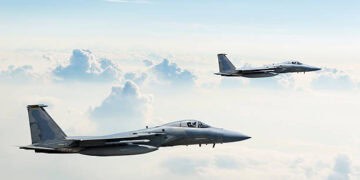TOKYO — Japan’s government has officially sanctioned a policy allowing the future sale of next-generation fighter jets, which are being co-developed with Britain and Italy, to countries outside the initial partnership. This step represents a significant shift from Japan’s longstanding adherence to post-World War II pacifist principles. The approval by Japan’s Cabinet also includes an amendment to the country’s guidelines on arms equipment and technology transfer. This amendment will permit the sale of co-produced lethal weapons to nations beyond the current partnership, aiming to enhance Japan’s contributions to global security and the development of its arms industry.
Chief Cabinet Secretary Yoshimasa Hayashi emphasized the necessity of these changes due to Japan’s current security challenges. He assured that despite these adjustments, Japan’s commitment to its pacifist stance remains firm, and any international sales of the fighter jets will undergo a rigorous approval process to align with this philosophy. This decision marks a departure from Japan’s previous policy, which heavily restricted arms exports in alignment with its pacifist constitution. The move is seen as a response to escalating regional tensions and aims to enable Japan to maintain a technological edge in defense capabilities, particularly in light of concerns regarding China and Russia.
Japan’s collaboration with Italy and the U.K. on the Global Combat Air Program (GCAP) seeks to develop an advanced fighter jet to modernize its fleet and replace older models with a state-of-the-art alternative by 2035. The policy change has faced criticism from some quarters, with opponents questioning the government’s commitment to the project without extensive public consultation or explicit approval for such a significant policy shift. In response, the government has stated that, for now, the export permissions will apply exclusively to the jet, with strict conditions that sales will not support active conflict zones.
Furthermore, sales will be restricted to the 15 countries with which Japan has established defense partnership and equipment transfer agreements. This move follows a gradual loosening of Japan’s arms export restrictions, including a 2014 decision to allow the export of certain non-lethal military supplies and a recent update permitting the sale of lethal weapons and components manufactured under licenses from other countries.
The decision is also seen as an effort to bolster Japan’s defense industry, which has historically served only the domestic market. By engaging more actively in international defense partnerships and the arms market, Japan aims to strengthen its military capabilities and industry. The policy change is timely, as Prime Minister Fumio Kishida is scheduled for a state visit to Washington, where he is expected to highlight Japan’s readiness to assume a more prominent role in military and defense industry collaborations.
Catch the latest supply chain news at The Supply Chain Report. Learn more about international trade at ADAMftd.com with free tools.
#DefenseNews #JapanMilitaryNews #GlobalSecurity #FighterJetsNews #PacifismPolicy















